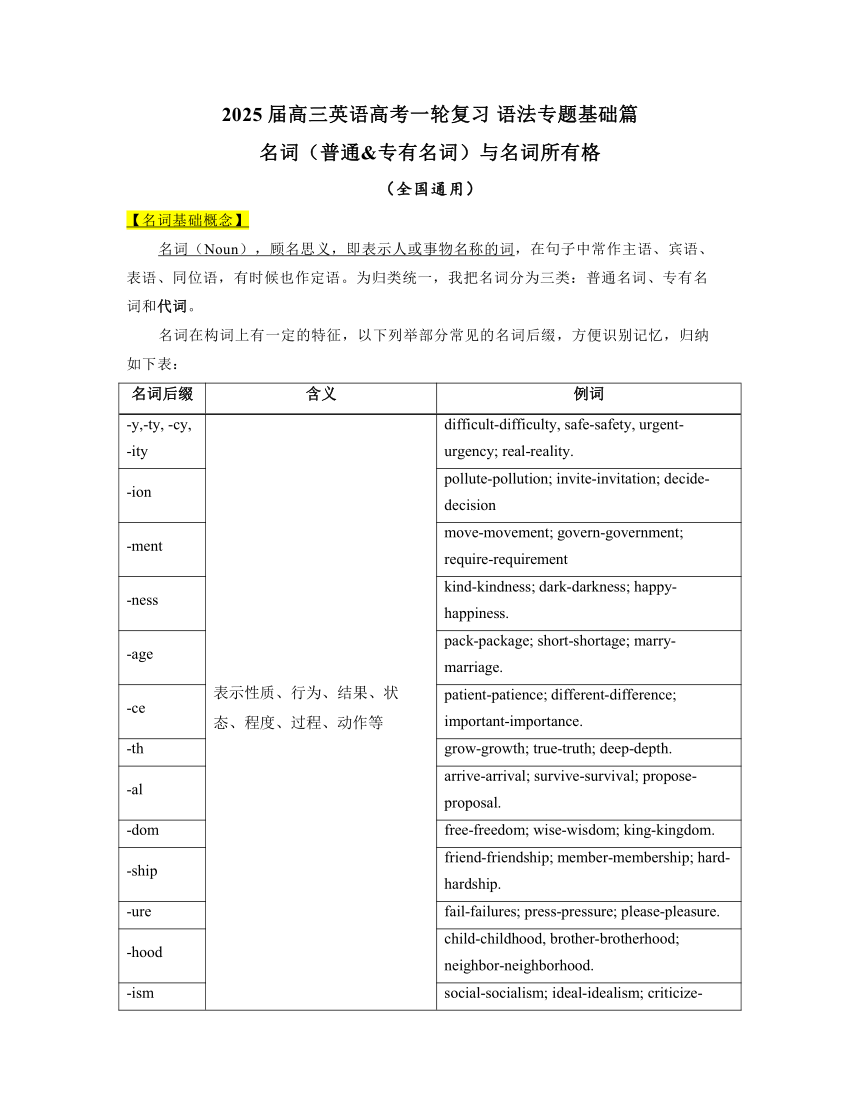
2025届高三英语高考一轮复习 语法专题基础篇 名词(普通&专有名词)与名词所有格 (全国通用) 【名词基础概念】 名词(Noun),顾名思义,即表示人或事物名称的词,在句子中常作主语、宾语、表语、同位语,有时候也作定语。为归类统一,我把名词分为三类:普通名词、专有名词和代词。 名词在构词上有一定的特征,以下列举部分常见的名词后缀,方便识别记忆,归纳如下表: 名词后缀 含义 例词 -y,-ty, -cy, -ity 表示性质、行为、结果、状态、程度、过程、动作等 difficult-difficulty, safe-safety, urgent-urgency; real-reality. -ion pollute-pollution; invite-invitation; decide-decision -ment move-movement; govern-government; require-requirement -ness kind-kindness; dark-darkness; happy-happiness. -age pack-package; short-shortage; marry-marriage. -ce patient-patience; different-difference; important-importance. -th grow-growth; true-truth; deep-depth. -al arrive-arrival; survive-survival; propose-proposal. -dom free-freedom; wise-wisdom; king-kingdom. -ship friend-friendship; member-membership; hard-hardship. -ure fail-failures; press-pressure; please-pleasure. -hood child-childhood, brother-brotherhood; neighbor-neighborhood. -ism social-socialism; ideal-idealism; criticize-criticism. -er/or/ess/e e 职业、身份 work-worker; act-actor; host-hostess; employ-employee. -ist art-artist; piano-pianist; science-scientist. -ant serve-servant; assist-assistant; participate-participant. -ian music-musician; civil-civilian; history-historian. -ive 一类人 native; relative; representative. 【普通名词】 英语中的普通名词(Common Noun)是用来指代普通事物的名称,如一类人、一类物品或一个概念。它们通常不具备特定的个体身份,而是泛指某个类别。普通名词是一种广泛使用的名词类型,用于描述日常生活中的事物,如house(房子),money(钱),car(汽车)等。为方便记忆,我把普通名词简单分为两类:可数名词和不可数名词。可数名词指的是数量可以被明确计算的事物或个体,如book(书), tree(树), animal(动物);不可数名词指的是无法被数数的事物或个体,它们通常表示抽象概念、液体、材料或集合体,如water(水),advice(建议),paper(纸),它们不能与不定冠词(a/an)或数词一起使用,只能与限定词some(一些), any(任何), much(很多),或特定的量词a piece of(一片), a lot of(许多)等一起使用。请看例句: 1.David owns a house in the city. 大卫在城里有一栋房子。 2.His father has two cars. 他父亲有两辆汽车。 3.People all want to make a lot of money. 人们都想赚很多钱。 我们知道,英语具有一致性原则,如果可数名词的数量大于“1”,就要用复数形式。为了发音便利,需要遵循不同的变化规则,归纳如下表: 名词特征 变化规则 例词 一般情况 在词尾加“s” books, pens, dogs, cats, cups, desks. 以 s,x,ch,sh 结尾 在词尾加“es buses, boxes, watches, dishes 以辅音字母+y结尾 把“y”改“i”加“es” city-cities, baby-babies story-stories. 以f或fe结尾 把“f”/“fe”改“v”加“es” life-lives, leaf-leaves, knife-knives. 某些词直接加“s” roof-roofs, belief-beliefs, proof-proofs 以o结尾 部分有生命的词加“es” tomatoes, potatoes, heroes 口诀:番茄土豆也是(es)英雄。 部分无生命的词加“s” photos, radios, pianos. 单复数同形 词尾不变形,意义可单可复 deer, sheep, species. 集体名词 形式为单数,意义可 ... ...
~~ 您好,已阅读到文档的结尾了 ~~